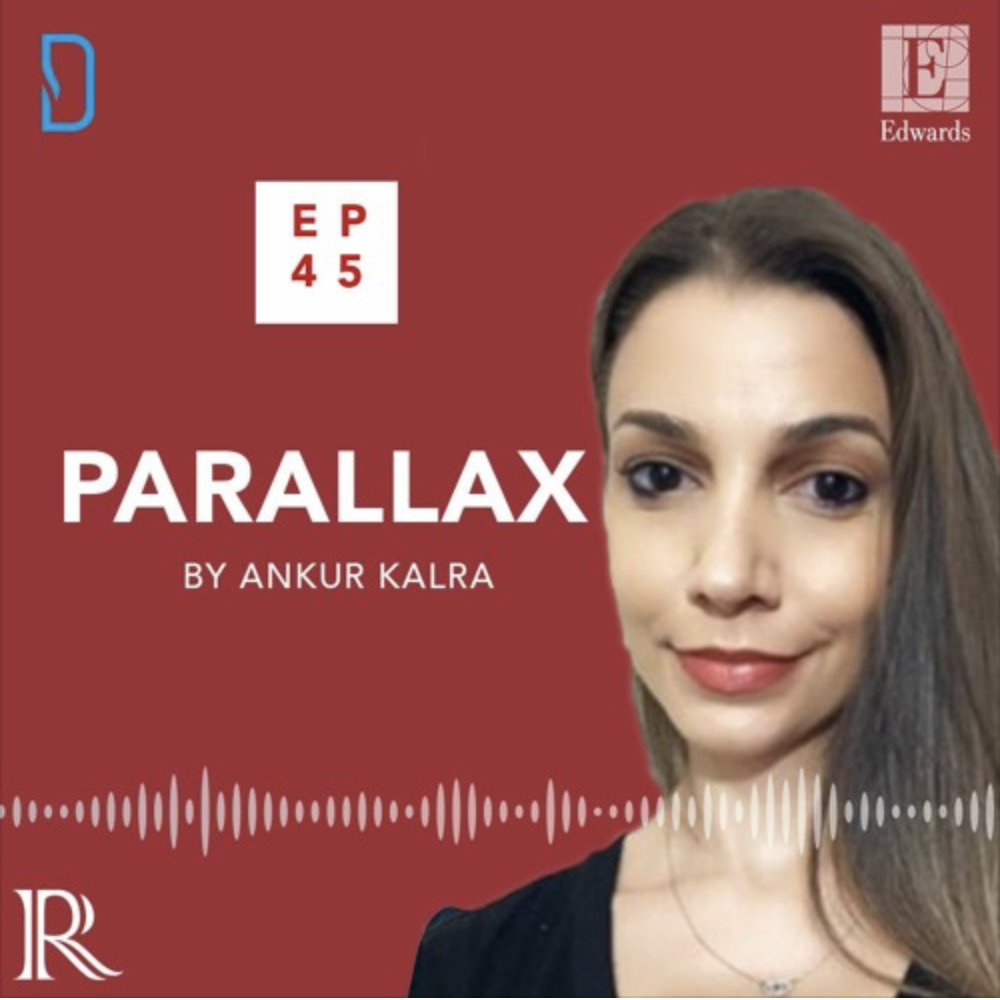
Two and a half weeks before her urgent orthotopic transplantation, Alin led the life of a busy emergency medicine resident. The warning signs of her dilated cardiomyopathy were drowned out by the demands of a 24-hour shift at her critical care unit. She recalls being confused while she was transferred to the Hospital of the University of Pennsylvania and was signed up for the organ transplant list.
After the heart transplant, while coming to terms with her condition, she decided not to let this “inconvenient life event” bring her down and take over her thoughts, and wrote the first post on her blog “a change of heart”. The blog is a space for raising awareness of organ donation, research and charities.
Dr Ankur Kalra’s guest is Dr Alin Gragossian, a critical care fellow, heart transplant recipient and advocate. In this episode, Alin talks about her journey as a patient, the psychological aspects of her recovery and her advocacy work. Ankur asks Alin about the mindset behind her sense of purpose and her dedication to help raise awareness of organ donation and young heart failure patients.
How did Dr Gragossian receive her diagnosis? How does she feel about her new reality? What drives her? What is her message to our listeners?
Read more about Dr Alin Gragossian's journey here: www.achangeofhe.art/blog
Questions and comments can be sent to “podcast@radciffe-group.com” and may be answered by Ankur in the next episode. Guest @AG_EM33, hosted by @AnkurKalraMD. Produced by @RadcliffeCARDIO.

Brought to you by Edwards: www.edwardstavr.com

Parallax’s guest this week is Dr Eric David Adler, Medical director of heart transplant and mechanical circulatory support at UC San Diego Health.
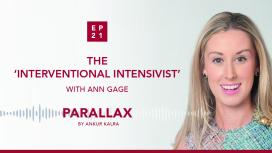
In this episode Ankur Kalra, MD meets with Dr Ann Gage, Cleveland Clinic’s first ‘interventional intensivist’. She discusses her unique skill set, what it means to be an interventionalist in the cath lab but also an expert in cardiovascular intensive care and advocates why such a unique skill set and critical care training are required in today’s modern medicine.
Listen to this engaging discussion between them on the challenges of being a woman in cardiovascular medicine today.
Submit your question to Ankur via: podcast@radciffe-group.com. Hosted by @AnkurKalraMD. Produced by @RadcliffeCARDIO.
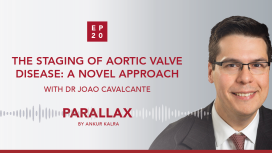
Listen to this, as well as an overview on his interesting childhood and his views on the future of cardiac imaging to treat TAVR.
Submit your question to Ankur via: podcast@radciffe-group.com. Hosted by @AnkurKalraMD. Produced by @RadcliffeCARDIO.
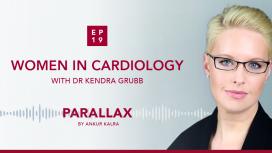
Her recent post on social media went viral. It was a photo of an all-women surgical team carrying out a complex structural heart procedure. It had over 100,000 views and was seen by people in over 75 different countries. It’s clear from this online reaction, that now is the time for women to be recognised for the work they are doing in medicine.
Listen to this engaging discussion between them on the challenges of being a woman in cardiovascular medicine today.
Submit your question to Ankur via: podcast@radciffe-group.com. Hosted by @AnkurKalraMD. Produced by @RadcliffeCARDIO.
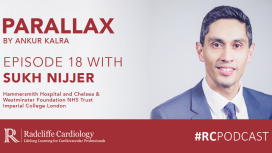
Trials discussed in detail include those presented at the ACC in New Orleans: PARTNER 3 & Evolut Low Risk on TAVR/TAVI, and SAFARI & COAPT on radial vs femoral access; presented at the ESC in Paris: THEMIS and ISAR-REACT 5 on DAPT post-PCI, DAPA-HF on SGLT2i’s for heart failure, and COMPLETE on PCI of non-culprit lesions in STEMI; presented at TCT in San Francisco: TWILIGHT on DAPT post-PCI, and EXCEL at 5 years on PCI vs CABG in left main CAD; and finally, presented at AHA in Philadelphia: ISCHEMIA on medical vs invasive approaches in ischemic events. Submit your question to Ankur via: podcast@radciffe-group.com.
Hosted by @AnkurKalraMD. Produced by @RadcliffeCARDIO.
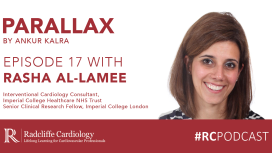
Ankur and Rasha also discuss the findings and unanswered questions of ORBITA, and how recent research in coronary revascularisation and stable ischemic heart disease has (or has not) changed their clinical practice. Finally, in anticipation of its presentation at AHA 2019, Rasha gives an overview of the International Study of Comparative Health Effectiveness with Medical and Invasive Approaches (ISCHEMIA). Submit your question to Ankur via: podcast@radciffe-group.com.
Hosted by @AnkurKalraMD. Produced by @RadcliffeCARDIO.
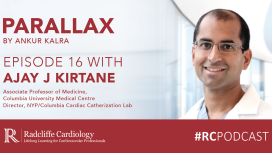
Ajay also talks about how he has negotiated between competing priorities in clinical and academic work, and how he manages fatherhood with a busy career. Ahead of the American Heart Association Scientific Sessions 2019, Ajay also shared what he thinks we can expect from the highly anticipate ISCHEMIA trial. Submit your question to Ankur via: podcast@radciffe-group.com.
Hosted by @AnkurKalraMD. Produced by @RadcliffeCARDIO.
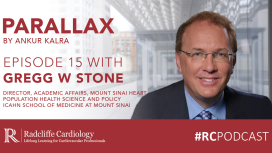
Gregg also shares his tips on how to progress from clinical practice to academic research, and what it takes to be a successful clinical investigator. Finally, Gregg shares with Ankur what personality traits he looks for in mentees and why presenting a final project is not enough. Submit your question to Ankur via: podcast@radciffe-group.com.
Hosted by @AnkurKalraMD. Produced by @RadcliffeCARDIO.
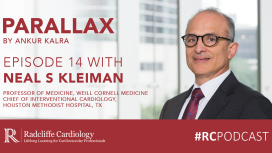
Digging more into the practicalities of everyday work-life, Neal reflects on the challenges of reporting to multiple bosses who have different goals, and how geography enabled him to move between cathlab and academia. Neal also shares what he looks for in early career academic cardiologists. Submit your question to Ankur via: podcast@radciffe-group.com.
Hosted by @AnkurKalraMD. Produced by @RadcliffeCARDIO.
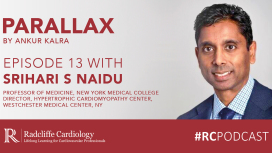
Ahead of TCT 2019, Ankur and Hari also talk about which trials presented in San Francisco they are most excited about! Submit your question to Ankur via: podcast@radciffe-group.com. Guest @SrihariNaiduMD.
Hosted by @AnkurKalraMD. Produced by @RadcliffeCARDIO.
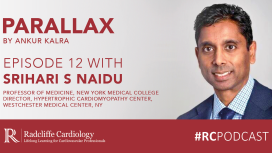
Having recently applied for the programme himself, Ankur also speaks with Hari about the history, purpose and future of the Society for Cardiovascular Angiography and Interventions (SCAI) Emerging Leader Mentorship (ELM) Fellowship Programme. Submit your question to: podcast@radciffe-group.com. Guest @SrihariNaiduMD.
Hosted by @AnkurKalraMD. Produced by @RadcliffeCARDIO.

In this episode, Ankur and Danielle speak about the evidence in favour of a whole-food plant-based diet to improve cardiovascular health, the ACC prevention guidelines, how to talk to patients about positive dietary change, the issue of lack of nutrition training in cardiovascular fellowships and what Danielle’s diet looks like as a busy whole-food plant-based cardiology fellow. On her own podcast ‘Nutrition Rounds’ Danielle has discussions about evidence-based plant-based nutrition with physicians who are leading experts in nutrition and health.
Hosted by @AnkurKalraMD. Produced by @RadcliffeCardiology.

In this brilliant conversation, Ankur, Emmanouil and Michael unravel the potential advantages, challenges and practical realities of using drug-coated balloons in SVD, and the findings of the latest randomised controlled trials studying this area.
Hosted by @AnkurKalraMD. Produced by @RadcliffeCardiology. [Disclaimer: The use of drug-coated balloons in coronay intervention is still off-label; it has not been approved by the FDA.]

Dawn is an associate editor of the journal Circulation: Cardiovascular Interventions and is widely known for her research program on PCI and peripheral arterial disease (PAD). Ankur and J. Dawn discuss multiple trials/studies that were published in 2018, including ORBITA, PIONEER-II and ABSORB. J. Dawn also shares her thoughts on the latest stent technologies.
Hosted by @AnkurKalraMD. Produced by @RadcliffeCardiology.

They discuss the importance of preventative medicine, their experience of reducing hypertension with non-pharmaceutical and pharmaceutical methods, and the significance of the integrated “team approach” when treating comorbid conditions such as hypertension. Athena also shares her thoughts on cardiologists’ responsibility to shape their patients’ lifestyle choices.
Hosted by @AnkurKalraMD. Produced by @RadcliffeCardiology.

Chest pain is one of the most common reasons for an emergency room visit in the US, with almost 6 million ER visits annually, yet there is no consensus on how to compare the results from various hscTn assays. Tune in to hear Santiago outline the advantages and limitations of using hscTn as a standard biomarket to evaluate patients with suspected ACS in the ER.
Hosted by @AnkurKalraMD. Produced by @RadcliffeCardiology.





